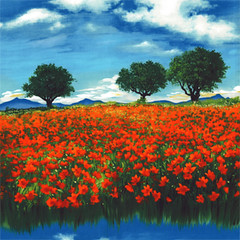If the government took charge and provided irrigation and power, Hismatullah Janan, another Zhari poppy grower, said he would gladly change to growing wheat or similar crops "so we could make an honest and decent living, and leave this so-called dirty work behind."
The Taliban banned poppy growing in 2000 on religious grounds and eradicated almost all of it in one season:
The first American narcotics experts to go to Afghanistan under Taliban rule have concluded that the movement's ban on opium-poppy cultivation appears to have wiped out the world's largest crop in less than a year, officials said today.
Then, of course, came 9/11 and the U.S. invasion of Afghanistan. With the Taliban marginalized, poppy growing came back. According to one version:
The Taliban have told farmers in Afghanistan that they are free to start planting poppy seeds again if the Americans decide to launch a military attack.
By 2004:
In November 2004, President Bush, backed by the civilian leadership of the Pentagon and powerful Republican congressmen like Henry Hyde of Illinois, suddenly increased U.S. funds committed to the conventional Afghan war on drugs sixfold to $780 million, including $150 million for aerial spraying.
By 2006:
When the Bush administration invaded Afghanistan in October 2001, poppies were grown on only 7,600 hectares. Under the American occupation that followed the defeat of the Taliban, poppy cultivation spread to every province, and overall production has increased exponentially ever since -- this year by 60 percent.
...As Alfred McCoy reports in "The Politics of Heroin," Afghan mujahedeen -- the guys President Ronald Reagan famously likened to "our founding fathers" -- ordered Afghan farmers to grow poppy; Afghan commanders and Pakistani intelligence agents refined heroin; the Pakistani army transported it to Karachi for shipment overseas; while the CIA made it all possible by providing legal cover for these operations.
In 2010, the U.S. started a new policy of not interfering with poppy cultivation.
From Gen. Stanley A. McChrystal on down, the military’s position is clear: “U.S. forces no longer eradicate,” as one NATO official put it. Opium is the main livelihood of 60 to 70 percent of the farmers in Marja, which was seized from Taliban rebels in a major offensive last month. American Marines occupying the area are under orders to leave the farmers’ fields alone.
“Marja is a special case right now,” said Cmdr. Jeffrey Eggers, a member of the general’s Strategic Advisory Group, his top advisory body. “We don’t trample the livelihood of those we’re trying to win over.”
The U.N. Office on Drugs and Crime agreed with the new policy.
Pictures of NATO and other allied soldiers “walking next to the opium fields won’t go well with domestic audiences, but the approach of postponing eradicating in this particular case is a sensible one,” said Jean-Luc Lemahieu, who is in charge of the United Nations Office on Drugs and Crime here.
Others denied the Taliban had a significant role in increased production, blaming the role of the Afghan state and corrupt officials and warlords..
The truth is that the opium trade is dominated not by insurgent groups, but by international organized crime groups, including the participation of corrupt government officials who may use the policy of eradication to eliminate competition and help the major drug lords to consolidate their control over the market.
In 2012, the Taliban again trashed poppy fields.
In 2014:
While government officials generally blame the Taliban for opium production, poppy fields can be found all over the country, even in areas where the government has full control. Mittal, the U.N. official, concedes the current level of production would not be possible without corruption and collusion at all levels of government.
A 2014 report by the European Parliamentary Service in 2014:
The Taliban, for its part, has been known to derive revenue from taxes and protection money tied to the opium trade; to make deals with local poppy cultivators and traders to build political alliances; and even to allow local mullahs to collect a ten percent tax on sales. However, it is estimated that government officials, police, and local and regional intermediaries are even bigger beneficiaries of the drugs trade.
Similar analysis:
Everyone is profiting. It touches all levels of Afghan society, both sides of the conflict, the Taliban and the government. The Taliban is definitely involved. They profit by taxing the trade, by taxing growers in their areas. But the government is even more involved. Government-linked officials are believed to earn an even higher piece of revenue from the opium trade.
...yes, the Taliban and other militant groups are definitely involved in the drug trade, and that is another reason why it’s so cancerous for the region. It funds all sorts of militant groups. But it shouldn’t be forgotten that this is something that is as much at the doorstep of the Afghan government as is the Taliban.
Whether it's the Taliban, other insurgents, corrupt government officials, or warlords, the result is the same: Eradication, prohibition and interdiction plans don't work.
Successful counternarcotics strategies are going to require a radically different approach from the status quo — one that replaces the punitive model of drug prohibition with a model that emphasizes public health and socioeconomic development. Prioritizing alternative development programs and demand reduction strategies would be a great place to start.
Another alternative: Poppy licensing to produce pain medicine.




